- Home
- Gavin Chappell
The Hadrian Legacy Page 5
The Hadrian Legacy Read online
Page 5
Flaminius heard a lowing sound, and turning he saw a bull snorting amidst a group of masked men in priest’s robes.
The cowled men urged Flaminius and his companions forward. Each was taken across the grille towards an altar on the far side of the subterranean chamber. Two men in gorgeous purple robes stood beside it. A statue of a young man wearing a Phrygian cap stood behind the altar, wrestling a bull to the ground.
The cowled figures chanted in some arcane tongue. A purple-robed man stepped forward, bearing a chalice. He put it to Flaminius’ lips.
‘Blood of Mithras,’ the high priest whispered.
Flaminius sipped, and tasted not blood but fine wine, spiced and strangely tangy. The high priest moved to each of the others, his companion following behind. This man handed Flaminius a small, flat, piece of unleavened bread.
‘Body of Mithras,’ he said in a hoarse voice, and moved on.
When all had been given the bread and wine, one of the cowled figures beckoned them forwards. Flaminius’ mind felt muzzy from the incense and the wine, and his head was pounding. His body was drenched in sweat, and the coppery scent of blood was rank in his nostrils. A warm, golden haze seemed to creep in on the edge of his vision.
Unresisting, he and the others followed the cowled man down the steps into a pit, lit only by light from the grille above. Here the cowled man took their cloaks and tunics from them, and they stood with their torsos bare.
The metal grille shuddered and creaked above them. Flaminius looked up to see the masked priests leading the bull onto the lattice. The purple clad man produced a pole axe and approached the beast. The next thing Flaminius knew, a rain of hot, sticky blood was pouring down through the grille.
It gushed down as the bull lurched to its knees, then toppled with a crash onto the metal grille. The blood bathed the unmoving men. They were drenched in gore now, and it mingled with their sweat to run in rivulets down their bare skin. The pounding in Flaminius’ head grew louder.
He seemed to glimpse a world beyond the darkness of the torch-lit pit. Superimposed on the gloom was a sea of trees, tossing and trembling in an unfelt breeze, extending on all sides. Figures moved among the trees, dark figures that turned to gaze towards Flaminius.
The pounding in his head grew beyond bearing…The distant chanting reached a crescendo…
The silence of early morning weighed down on Flaminius like an unbearable burden. He sat at the top of the steps to the palace cellars where he had been initiated into the cult of Mithras, the blood and sweat cooled and sticky on his skin. The raven brand in his forehead was now no more than a dull, throbbing ache. His mind was filled with images from the night, but now he gazed out at a brilliant new dawn, seeing for the first time the vibrant colours of the houses and the trees and the great blue vault of the heavens. He felt more at peace than he could remember being since early childhood.
He had thought that he was going to learn the truth about the assassination. He had only accompanied Junius Italicus with that in mind. But instead he had been initiated into a mystery cult. His father had always spoke against such things: What need had good Roman citizens for the mysteries of Eleusis, or to peer pruriently beneath the veil of Isis? It was positively indecent! Rome had the gods of Rome, and that was all it ever needed. This enthusiasm for the gods of the Greeks and the barbarians would only spell trouble.
Flaminius felt exhausted, and not just because he could hear his father’s carping voice in his mind. What had they put in that wine, hemp? Poppy juice? Absently he picked clots of oxblood from his hair.
‘Now you know.’ Junius Italicus sat down beside him. He grinned at his superior officer as if they were equals. ‘Now you’re one of us.’
‘I thought I was going to learn why Pulcher was killed,’ Flaminius said.
Junius Italicus laughed. His usually affable expression was replaced by one of zeal. ‘Something far more important,’ he said. ‘You’re one of us, now, even if you’re not a soldier yet. You’re still a Raven.’
Flaminius fingered the unhealed brand in the flesh of his forehead. Junius tutted like a nursemaid, pulled his hand away, and inspected it closely.
‘You’ll heal,’ he said. ‘Just don’t poke at it.’
Mithraism was a new cult in the west, having grown in popularity since Trajan’s abortive invasion of Mesopotamia. Although it had its roots in the dry desert soil of Persia, it preached manly virtues, and loyalty to the king of kings, or the emperor in their case.
Now Flaminius knew that his former suspicions about Corvus were wrong. The procurator could hardly belong to this cult and have seditious inclinations. In recent years Flaminius had learnt to suspect everyone. He’d had reason to. People he’d thought close to him had betrayed him. But now he was part of the cult, he had friends. He had a friend in Mithras. He had a friend in Junius Italicus, if he hadn’t before. He had a friend—Jove help him! —in Lucius Julius Corvus.
The mystery the procurator had hinted at was explained. Flaminius was enlightened. But the true mystery had yet to be solved.
He turned and, like Hadrian’s bronze statue, stared north.
—8—
‘This man Corvus,’ the governor barked, leaning back in his chair, ‘is he sound?’
Aulus Platorius Nepos was an intolerant man with a rasping voice. Black eyes glowered at Flaminius from beneath bushy eyebrows. He wore a silvered cuirass and military belt, and a serviceable-looking, unornamented short sword hung at his hip.
When the governor had arrived in Londinium that morning, he’d been closeted with Corvus for several hours. Now, when Flaminius was feeling like some lunch, he had summoned him to his office in the basilica and started questioning him closely.
‘I’m sure he has a fine financial mind,’ Flaminius replied blandly.
Thin-lipped, Platorius Nepos shook his head. ‘Not what I asked. Is the man sound? Never met him before. Seems an odd fish.’
Flaminius pursed his lips. ‘He has some eccentric ideas.’
‘In what way?’
Flaminius shrugged. ‘Obsessed with a foreign cult he took up with, out east.’
He stopped himself from rubbing the healing scar in his forehead. When the priest had pressed the metal brand with its raven shaped tip into Flaminius’ forehead, he’d felt no more than a brief sting. Now that it was scabbed over, it was quite painful.
Platorius Nepos grunted. ‘Fellow’s pious, that’s all. Should be more of it about. If fewer people ignored the laws of the gods, we wouldn’t be in this mess.’
Flaminius forbore from asking which particular mess the governor meant. Platorius Nepos was one of the old guard, and saw anything new as a sign of terminal decadence. He reminded Flaminius of his father, although his attitude towards religion was more liberal.
‘Very well,’ Flaminius said, ‘but speaking as an imperial agent, cults are a worry. Too many of them are a front for political movements.’
Platorius Nepos laughed. ‘You think he’s got friends pulling the strings? That’s what all this piety’s about? Could be. But everyone needs friends in high places if they’re to get on; gods or consuls; that’s what politics is about. Must be the case with you, young fellow, to have got so far so fast.’
He peered thoughtfully at Flaminius’ raven brand.
‘I ought to be concentrating on what happened up by the Wall,’ Flaminius said. ‘When will you be returning?’
‘I’m not staying long,’ the governor said. ‘There’s nothing to concern me down here, now I’ve sounded out the new procurator. His Imperial Majesty left Britain very peaceful. What trouble there is is up north, and where trouble goes, there go I.’
He said the last in mock dramatic tones, and rose to shake Flaminius’ hand.
‘And will the procurator be accompanying us to the Wall?’ Flaminius asked.
Platorius Nepos puffed his cheeks out. ‘He’ll stay in the south, where it’s safe. The Wall’s a dangerous place—particularly for procurators, it se
ems,’ he added with a sardonic chuckle. Flaminius echoed it half-heartedly. ‘Glad to have had this chat,’ the governor added, showing him out.
Flaminius walked towards the camp gates. As he turned a corner, he met Junius Italicus with a group of centurions. He stopped him and as the other centurions walked on repeated what the governor had said.
‘So we’ll be heading north in the next few days.’
Junius Italicus leaned forward and examined the scab on Flaminius’ forehead.
‘Don’t do that,’ Flaminius snapped, uncomfortable.
‘Sorry sir,’ Junius Italicus said.
Flaminius frowned at him. ‘Walk with me,’ he said, and the centurion obeyed.
‘Do you really believe?’ he asked as they passed out of the gate and walked towards the town. Nearby, several buildings were under construction.
‘Sir?’ Junius Italicus said blankly.
Flaminius picked a clot of bull’s blood from the hair at the back of his neck. ‘Mithras.’
The centurion said nothing for a moment. Then he said, ‘Mithras has been a friend to me. I wouldn’t have got where I have in life if I hadn’t become his follower, out there, out in Syria during the Mesopotamian campaign.’
Flaminius had never had much time for religion. It was a part of daily life, but his experience of it mainly involved standing around until his feet hurt while some bigwig shed an animal’s blood.
‘It seems wrong to be following a god of the Parthians,’ he added. ‘They’re our enemies.’
Junius Italicus shook his head. ‘There’s only one god,’ he explained. ‘He’s higher than all nations and empires, though he has different names and different faces. All he asks is that men are men, and that they are loyal.’
‘Loyal to who?’
‘To each other,’ the centurion said. ‘To each other—and to the ruler, who is divinely appointed.’ He smiled. ‘You worry too much, sir. The cult of Mithras is on our side. It’s the druids we need to worry about.’
Junius Italicus was right. It was of little or no consequence that the legions were riddled with worshippers of this eastern god. But if the Gaulish auxiliaries were secretly followers of the druids, that mattered. They had killed the procurator.
Walking down the streets of this peaceful, thriving town, beneath the pillar bearing Hadrian’s statue, Flaminius knew that he would never find the answers here. As they crossed the stream on a wooden bridge, he followed the statue’s gaze.
To the north.
Two days later, as the rain fell again, the governor set out for the Wall. Flaminius and Junius Italicus joined the long cavalcade of legionaries, auxiliaries, and imperial personnel as they left the suburbs of Londinium and tramped out into the countryside.
Departing the procurator’s palace that morning, after a fulsome farewell from Corvus, the tribune had noticed a familiar female figure in the courtyard. Having seen nothing of Epasias over the last day or two, he’d been surprised that she was not with the procurator when he came to bid farewell.
‘You go to the North?’ she asked as he saluted her.
Flaminius nodded. ‘I may not see you again, ma’am,’ he said. ‘It’ll be strange after having spent so much time together on the journey, but duty calls.’
She caught his forearm and looked deep into his eyes. ‘And duty is very important to you.’ She reached out a gentle forefinger to touch the crusted scab on his forehead. Flaminius wished people would stop doing that. ‘I can see that. I can see you are… devoted.’
Flaminius frowned. ‘You shouldn’t know anything about that.’ The mysteries of Mithras were forbidden to women; he knew that much even as an initiate of only a few days’ standing.
She smiled mysteriously. ‘About what?’ she said. ‘All I know is that I see a man who is loyal to his superiors and follows orders. That’s good. That’s admirable. I hope that we will become better acquainted one of these days.’
‘I would enjoy that, ma’am,’ he said, thinking it unlikely.
He heard a noise from behind him and turned to see Marcius Magnus watching them both from a doorway. He turned and vanished inside.
‘Magnus has got the best idea,’ said Flaminius. He was trying to make light of it, although he didn’t much like being spied upon. No professional likes to see their work usurped by amateurs. ‘I must be leaving, and you’d better get inside. It looks like it’s going to rain.’
She lifted the hood of her Gaulish cloak and settled it more firmly over her face, so her features almost vanished. Then she turned and without speaking walked away.
Flaminius found Junius Italicus waiting for him on the parade ground where the rest of the governor’s staff were assembled. He had horses for both of them.
‘And Rome wants to keep hold of this country!’ Flaminius indicated the rainclouds. He mounted the horse and waited for the order to set out.
The journey took several days. Although they travelled by Roman road rather than native trackway, they were impeded by the weather, which did not improve, and had resulted in flooding in various parts of the country.
It was a week before they trotted into Eboracum, the camp at the heart of the Brigantian country. Here Platorius Nepos had business to attend to and court cases to hear, and they were delayed a couple of days.
—9—
Eboracum, Britain, 223 AD, June 1
On the morning of the second day, Flaminius decided that he and Junius Italicus would continue alone, and went down to the governor’s headquarters to communicate this. As he passed a small grove of crucified felons—he was starting to understand how the emperor had restored order to this province—he had a surprise encounter.
‘Gaius!’ said the stormy faced woman striding from the governor’s office. ‘By Taranis, is it you? You’ve changed!’
He stared at her, mouth open in amazement. ‘So have you!’ he said finally, not quite sure what he was saying.
The last time he’d seen Drustica was in this very camp, when she parted from him to return to her tribe, the Carvettians. He remembered the time they had shared together, how she and some of her tribesmen had accompanied him on the hectic journey to Hadrian’s villa. Here she was, only a few years older, but she had utterly changed.
She affected Roman clothes, a toga that she wore poorly (ladies back in Rome wore stolae), and a long cloak. Her fair hair was primped in a Roman hairstyle, as if she had just come from an upmarket hairdresser. She seemed somehow taller, prouder—she’d never been precisely humble—but angry. But not angry to see him. She spread her arms out to welcome him, but when he paused, a little embarrassed despite himself by this show of affection in the middle of a military establishment, she frowned.
‘I suppose you have a woman in Rome now,’ she said, her icily attractive face set in a disapproving scowl. ‘I know Romans take only one woman. A… wife, is it?’
Among the northern tribes, relations between men and women were openly scandalous (unlike Rome, where all the scandal went on in secret); men owning women in common was how one writer described it, but no one had ever owned Drustica. She had given Flaminius her heart, but he had tactfully avoided an entanglement that could have compromised his career.
He shook his head. ‘I have no wife. There was someone, but… She’s with the shades now.’
Drustica’s face softened. ‘I too have lost much since we last met,’ she told him. ‘And gained much too,’ she added with a nervous laugh, twirling coquettishly to show off her Roman outfit. ‘Does it suit me?’
‘I preferred the barbarian warrior woman,’ Flaminius said wryly. ‘Look, we can’t stand around here all day. I have temporary quarters nearby. Come back with me! Tell me about everything.’
Drustica folded her arms. ‘A Roman lady such as myself, go back to the quarters of a legionary?’ She laughed and he laughed with her and they walked back to his quarters. As they did, the rain eased off and the sun peeped out from behind the clouds.
‘How did you become a Roma
n citizen?’ he asked as they entered his vestibule.
She studied him in surprise. ‘It was my reward,’ she said. ‘For saving the emperor. You joined the Praetorians—I was made a Roman citizen. I donned the toga last year.’
Flaminius supressed a laugh. In Rome, ladies had not worn togas in a long time. They did things differently out in the provinces.
‘But it seems to count for nothing,’ she went on glumly. ‘That’s why I came south when I heard the governor was returning to Eboracum.’ She looked fondly at him. ‘I had not expected to see you again, Gaius.’
‘Being Roman seems to count for nothing?’ Flaminius echoed.
He had been going to tell Platorius Nepos he meant to go north to the Wall. Perhaps he could accompany Drustica.
‘You have heard of this Wall the emperor is building?’ Drustica asked. ‘They are building it straight through my people’s ancestral territory!’ she added angrily. ‘It will mean that we cannot drive our cattle to their summer pastures as we have done since the morning of the world. I have spoken to the governor on several occasions, but he refuses to listen to reason! This time he dismissed me irritably with a cold word and a shake of the head. I am a Roman citizen, Gaius, not the peregrine you remember!’
She was growing increasingly furious. Junius Italicus appeared in the doorway, gazing curiously at her. Drustica broke off abruptly.
‘This is Centurion Italicus,’ Flaminius hurried to explain. ‘He’s here with me on a mission. Centurion, this is Drustica…’
‘Publia Aelia Drustica,’ she corrected him. ‘I am a Roman citizen.’ Her British accent sounded thicker than ever.
‘So I heard,’ Junius Italicus said. ‘Pleased to meet you,’ he added when Flaminius shot him a cold glance. ‘Ma’am.’
‘Drustica was of great help to me in rescuing the emperor from assassination,’ Flaminius explained.
‘What brings you here?’ she asked. Then she put a hand to her mouth. ‘No, I shouldn’t ask. It will be on a need to know basis.’

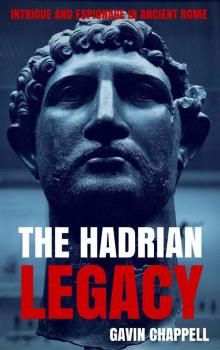 The Hadrian Legacy
The Hadrian Legacy On Hadrian's Secret Service
On Hadrian's Secret Service Murder in Hadrian's Villa
Murder in Hadrian's Villa The Sword of Wayland
The Sword of Wayland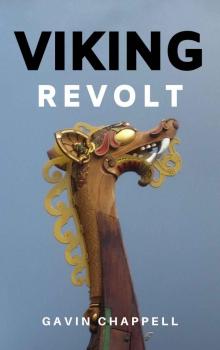 Viking Revolt
Viking Revolt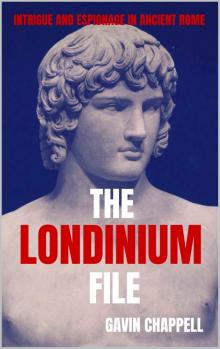 The Londinium File
The Londinium File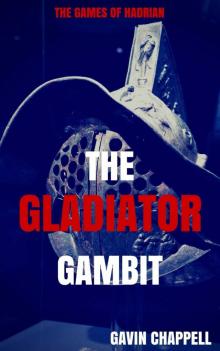 The Gladiator Gambit
The Gladiator Gambit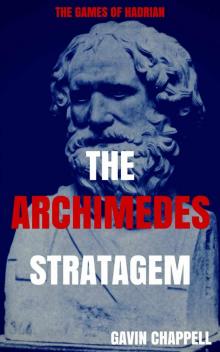 The Archimedes Stratagem
The Archimedes Stratagem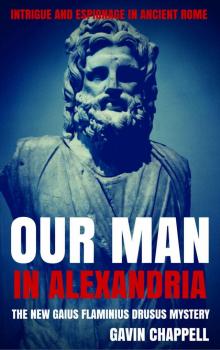 Our Man in Alexandria
Our Man in Alexandria Into the Void (The Dungeoneers)
Into the Void (The Dungeoneers)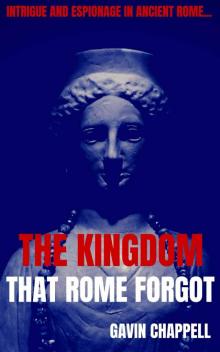 The Kingdom That Rome Forgot
The Kingdom That Rome Forgot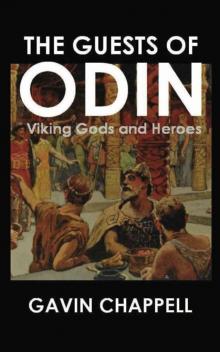 The Guests of Odin
The Guests of Odin